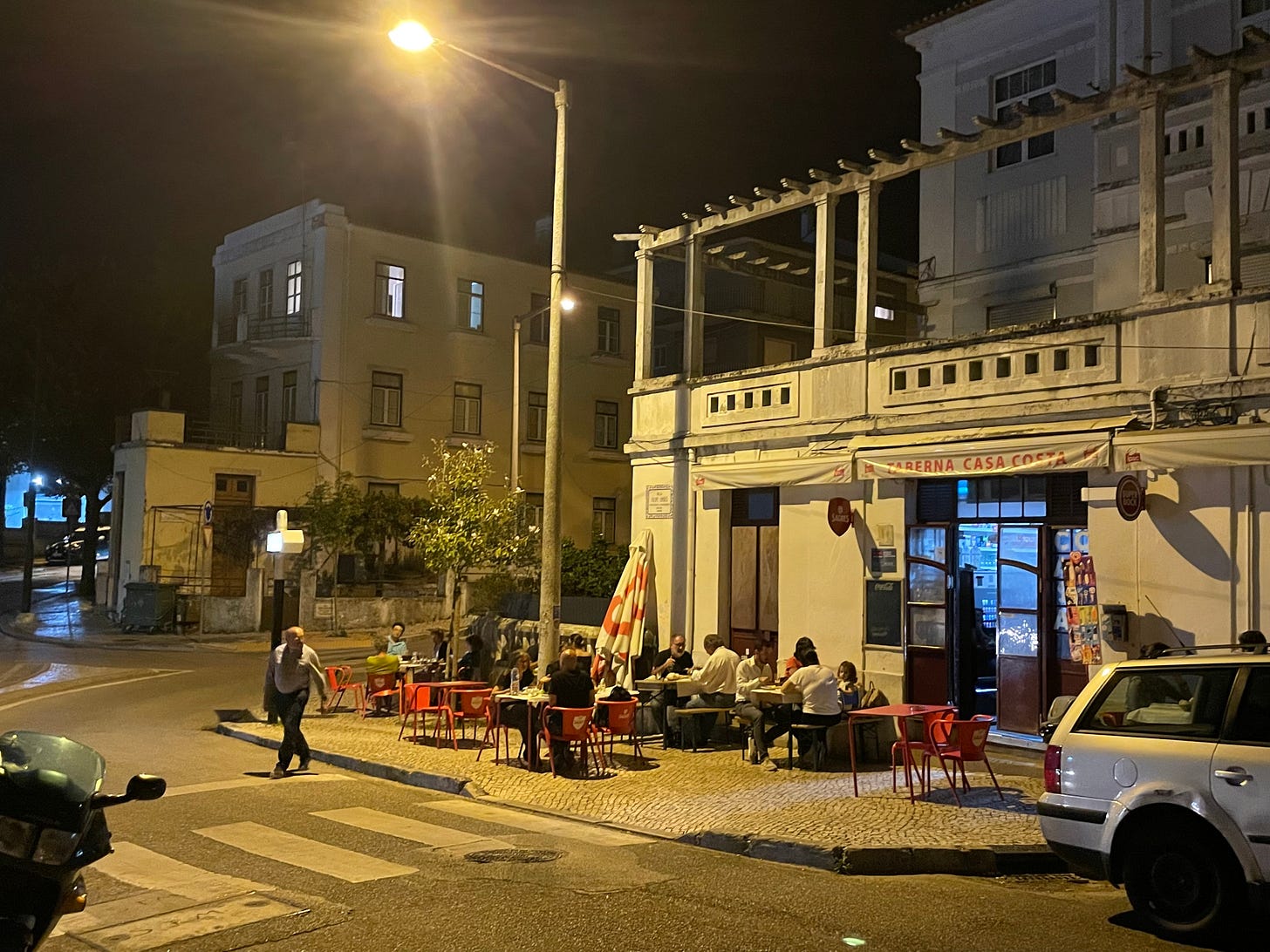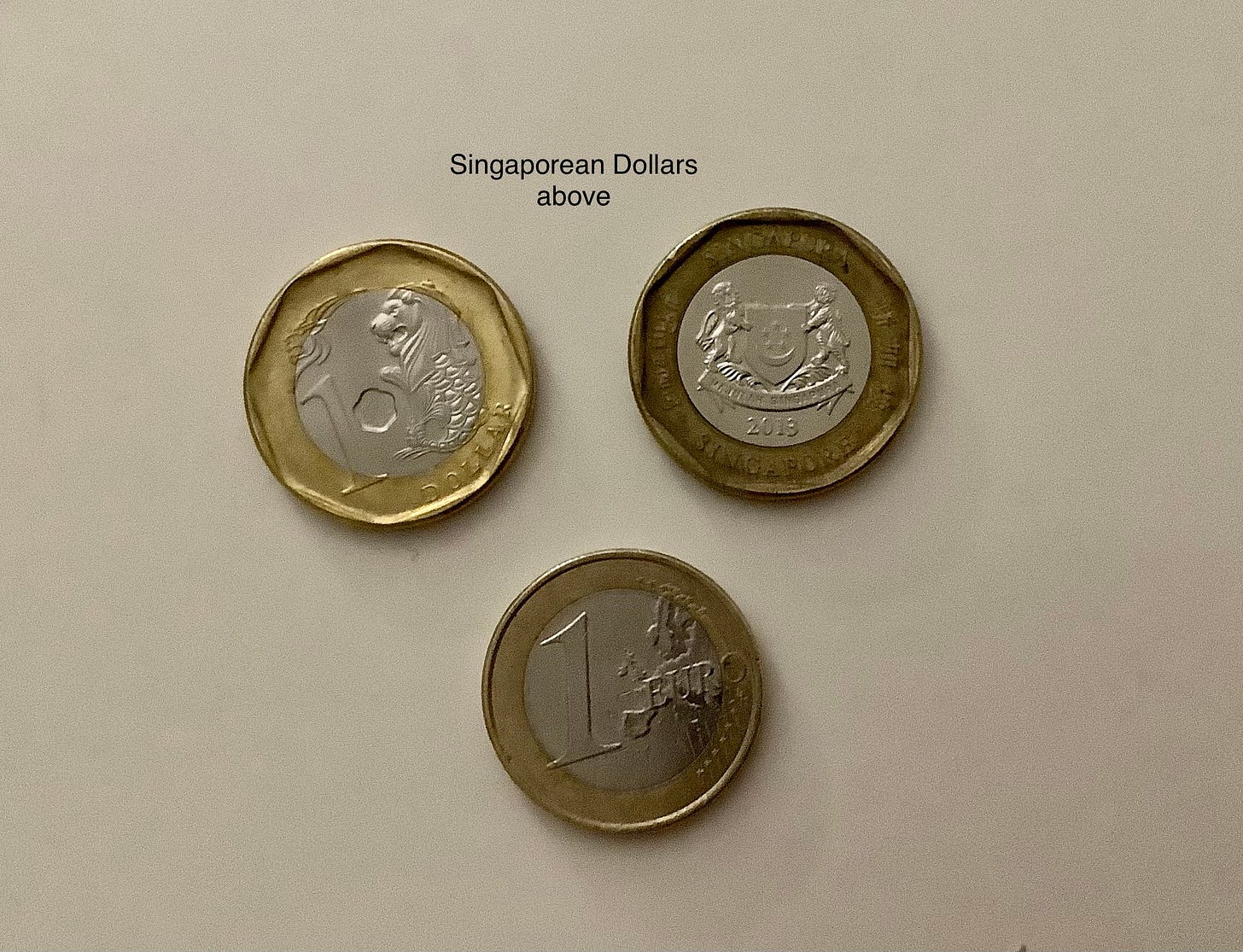The Other Side of the Coin
When dining with international travelers, you have to stay alert for change.
The only time you can get an Uber in less than two minutes is when you are not in a hurry. So we made a somewhat rushed departure from a dinner with friends the other night which was not a reflection of any lack of enjoyment, but still resulted in a less than graceful exit from said soirée.
The occasion was sort of a welcoming back for one of our Australian friends who recently returned from an epic pilgrimage to Papua New Guinea to hike the KoKoda Trail, known as one of the toughest multi-day treks in the world.1
It was another evening of convivial friendship intermingled with international culinary and cultural flavors worthy of at least one chapter in my memoirs should I ever become so pompous as to write one. We were at a popular sidewalk café, known for good food and a great view of the old prison across the street.
One of the evenings surprise highlights was meeting a Chinese gentleman seated at a nearby table. He looked a bit lonely, possibly being the only other non-Portuguese enjoying the beautiful evening at this popular local café. Aussies seem imbued with a penchant for inclusiveness, and so he was invited to join us.
Now my wife and I hail from a small town in the southern foothills of Colorado, population around 17,000. Canōn City is the third oldest city in the State of Colorado, but somehow has retained its small town character. Locals are proud of their history and proud of the beautiful landscape at the base of the Rocky Mountains. However, it is not a hotbed of cultural diversity, being almost 94% Caucasian and with only 1% of its residents being foreign born. So for us it’s a delight, while living here in Portugal, to meet people from other cultures. And Portugal has been known as a cultural melting pot since the Renaissance.
Our new table-mate spoke perfect English, one of five or six languages he is fluent in and is a research scientist here for a meeting at Coimbra’s University. He is now a resident of another EU country where he lives with his wife and family. Now living away from China for twenty years, he visits his parents yearly. We discussed globalization, Asian-American trade relations, the de-coupling of technology and chip-making, China’s past one-child policy and it’s effects, as well as the future of political relations between the USA and China. He works with a multinational team of researchers who recently published a study in a leading scientific journal.
When expats talk about reasons for living abroad, this is the kind of perk that usually doesn’t get talked about. It’s an unquantifiable, random condiment that flavors our experiences living abroad. We were telling friends about our Chinese acquaintance the next day and they related a similar experience the previous week with two young students they met at a wedding anniversary celebration. Hailing from Timor, a former Portuguese colony, the women spoke openly about their country’s horrendous history of civil unrest and yet they were hopefully optimistic about the future of one of the poorest counties in the world.
As big as the world is, we are amazed at the connectedness felt in discovering how much we are all alike. Embarrassingly, many of these new cultural exchanges lead to hasty educational explorations of the internet to patch up the holes in our shaky world geography when we return home.
When our evening got late, we dialed up a Uber and went inside the café to settle our bill, enduring the further embarrassment of our limited Portuguese language skills. Eventually, we got a printed bill and tried to split the 43.70 euro tab evenly. This required my friend and I digging out numerous odd coinage, but we put it all on the counter believing it to be correct. My Aussie friend then repaired to the WC to return the processed beer to the appropriate collection point in the rear of the establishment and missed the following mini-drama.
Our waiter came out a few minutes later, a bit flustered and agitated about something regarding the coinage involved in paying our bill. He excitedly told us, in his best rapid-fire Portuguese, that there was something unsatisfactory about monetary exchange. He plopped two coins down on the table and, using my limited linguistic acuities, discerned that he wanted something more/different/? In the semi-darkness of our street-side table, it appeared he was unhappy with the pair of one Euro coins he had deposited on the table next to a bit of left-over gravy from the Chanfana bowl we had enjoyed.
Clueless to the source of his excitement, I relied on my well-honed Expat skills to diffuse the situation. I pulled out my wallet, gave him a five euro note and shrugged my shoulders.
This created more excitement, celebratory arm waving and another burst of indecipherable Portuguese. He left briefly and then appeared at the establishment’s entrance, waving, smiling and pointing back and forth to something in his hands and at me. I wasn’t sure if this was a culinary ritual or if he was just excited that we were finally leaving. I waved back and all appeared well. About that time our Uber showed up unexpectedly early and we exchanged hurried goodbyes.
In any case, the source of our waiter’s excitement and the mini-drama wasn’t revealed until the next morning’s light. I had gone to bed sleepily wondering what was special about the coins he returned to me and there, in the new light of day, I could finally see the truth.
My Aussie friend had made a side trip on his Papua New Guinea excursion to Singapore. Apparently, he still had some loose Singaporean dollars, almost identical in size and color to one Euro coins used in Portugal. Evidently, our Café isn’t as open to cross-cultural exchanges or, at least, those involving money. Proving, once again, that change is hard.
also has an immense historical significance as it was the epicenter of the Kokoda Battle between the Japanese and the Australian Forces in WWII. Many Australians consider The Kokoda campaign the “last stand” to keep their country from being invaded during WW II and each year, thousands of Australians visit to pay homage to the soldiers that died there.
Over the course of 96 kilometers, you can expect to gain over 6000 meters of incline on the Komodo track. The trail is in a constant state of undulation with 300m of climbing followed by a 200m drop. Despite the total incline of 6000m+, the highest point of altitude is 2,190m at Mt. Bellamy







this is the kind of perk that usually doesn’t get talked about. It’s an unquantifiable, random condiment that flavors our experiences living abroad